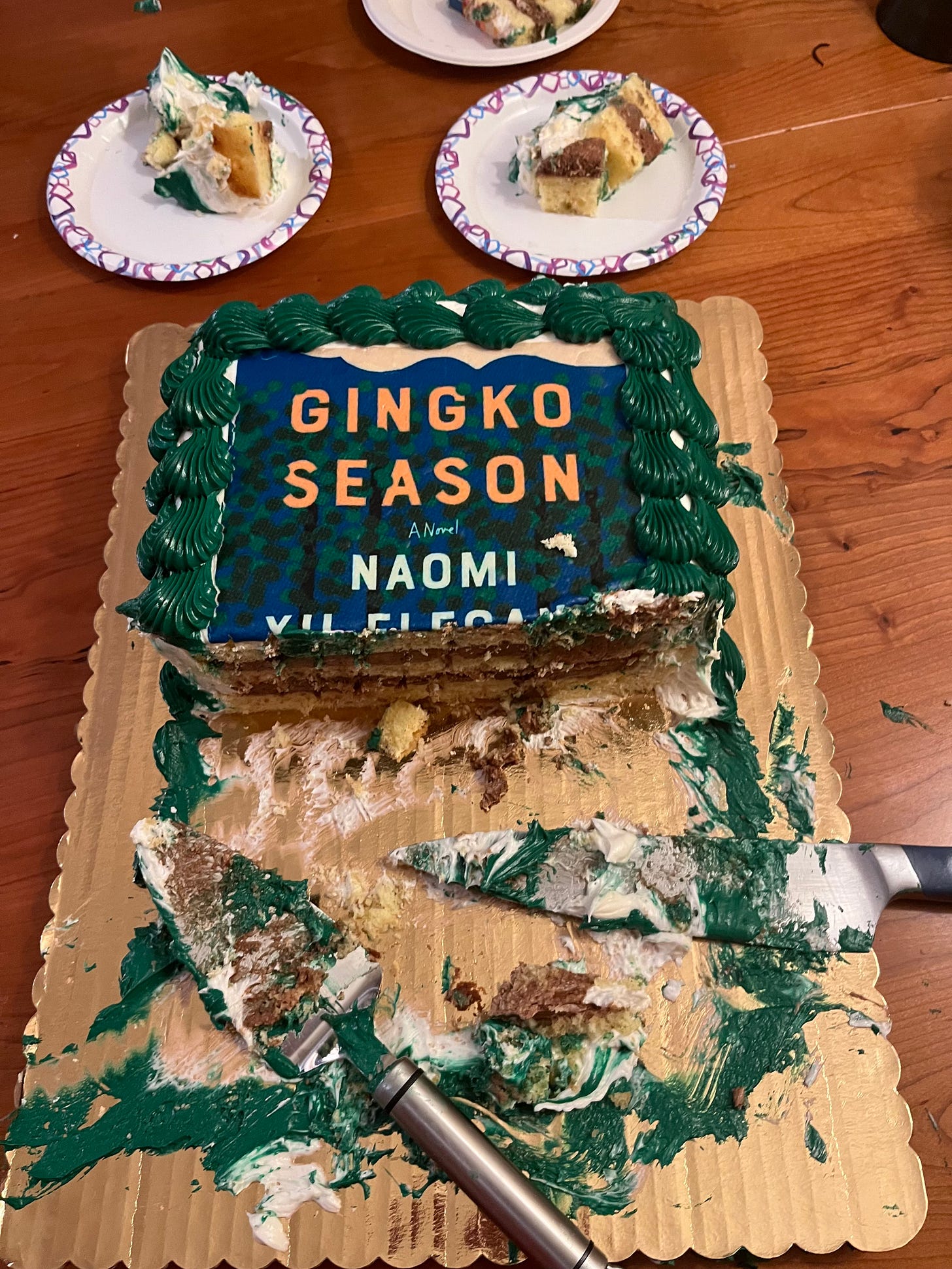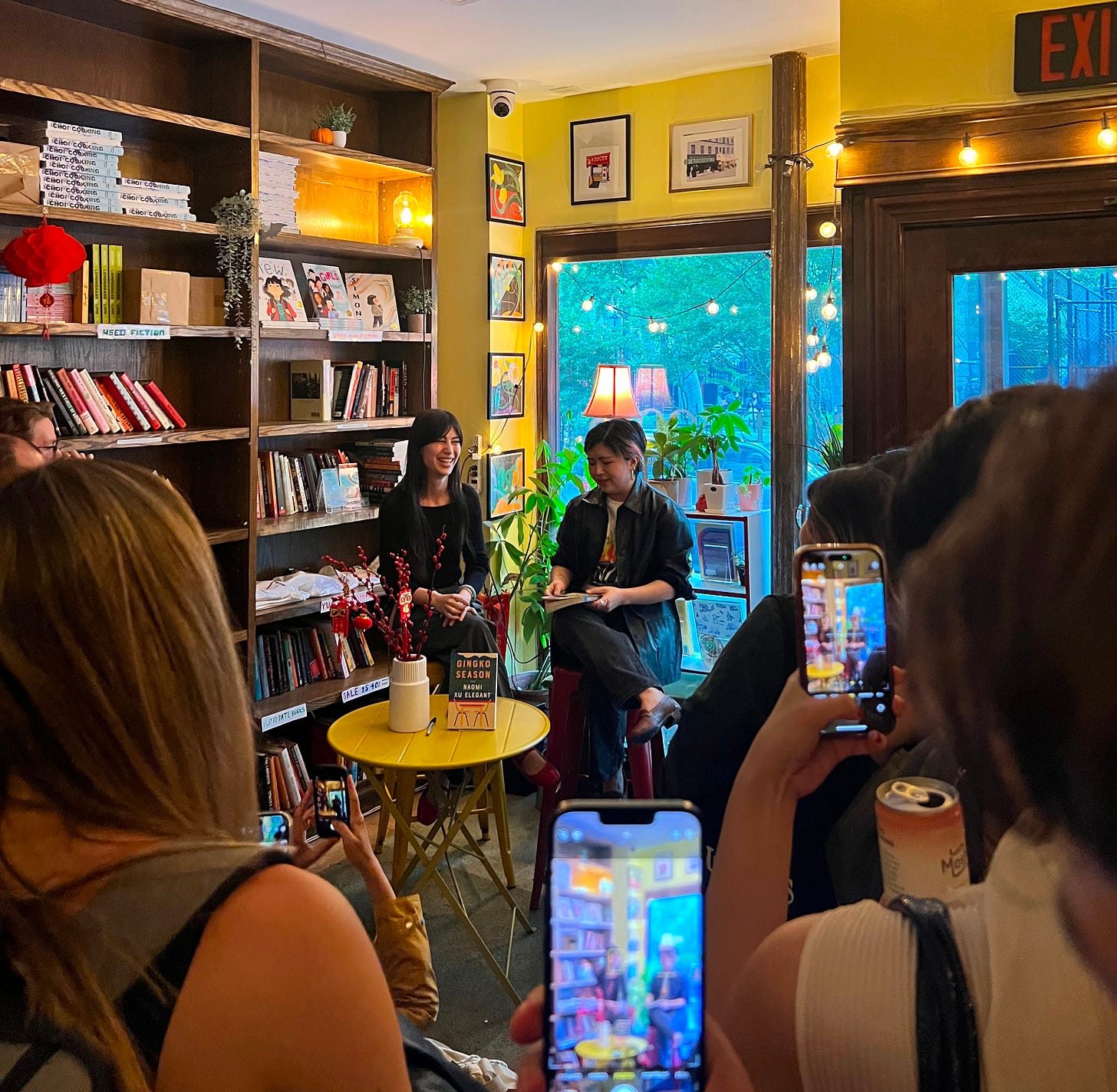My debut novel, Gingko Season, came out last week. I completed the first draft in January 2023, and sold the book a few months later. I wrote most of it in 2022 but some scenes and lines I wrote as far back as 2018. After so many years of it being a private project, worked on in solitude and then shared with a small number of people, I was a little apprehensive about it finally being out in the world, though that is, of course, the point. I’ve been pleasantly surprised by how calm I’ve been; it was anticlimactic, in a good way. I’ve loved seeing my friends holding copies of the book and telling me they’re reading it and sending photos of it on shelves and tables in bookstores across the country.
The launch event for Gingko Season took place at Yu & Me Books in Manhattan’s Chinatown. The small space was filled with friends and family. One of my best friends flew in from LA, surprising me, and I saw people I haven’t seen in years, and was touched that they came out to support me and buy the book and listen to me talk. Friends and relatives came from San Fransisco and Detroit and Miami, my parents from Malaysia, and my brother from Sydney, so he wins the Farthest Traveled award.
I did a Q&A with Gina Chung, the author of Sea Change and Green Frog. Gina is a very talented writer and turned out to be a brilliant interlocutor as well. She prepared a series of thoughtful and super fun questions about my book, and her relaxed, good-humoured competency helped me chill out (I was nervous all day leading up to the talk). Then I signed some copies of Gingko Season, trying out my dubious new author signature, and the attendees bought up all the copies in stock.
After the event we walked to the nearby Whiskey Tavern for celebratory drinks. I am sometimes very disorganised and had planned nothing for the evening until earlier that day, when I selected the bar based on proximity to the bookstore and reserved a couple of tables. They emailed to ask if there was any special occasion and I told them I was launching my book. When we arrived at the bar, we saw that they had printed out copies of the book cover and hung a banner that said “CONGRATULATIONS ON LAUNCHING YOUR BOOK NAOMI … WE’RE SO PROUD OF YOU!!!!!!!” It was a lovely surprise. Something about the fact that the “we’re” logically referred to the bar employees whom I’d never met was so funny, and weirdly moving. And our server was wearing a Yu & Me hat!


This was not a book of the big advance, Times Square billboard variety, so my publication week and its lead up was pretty relaxed, which has been nice (I’m easily overwhelmed). The day after the Yu & Me event we had a cosy family party in the apartment of dear friends, with a book cover cake. I had a fun conversation with Megan Labrise of Kirkus Reviews for their Fully Booked podcast, which you can listen to here. A couple more podcasts coming up, and a couple of events in August and beyond. I’ve been pondering some guerrilla marketing tactics but I’m mostly happy for Gingko Season to live its life in the world without me (but of course with my support) and get to work on my second novel, which I’m excited to write.
I treasure the creative cycle of depletion, rest, recharge, and renewal. I can’t remember when exactly the transition happened and I felt the door close on GS and open on [redacted] but it’s a great feeling, to find out, after putting everything you can into your first book — Your First Book!! — that there is gas in the tank again, and you’re ready(ish) to go. Obviously Book #2 might turn out to be terrible and a total failure but that’s okay, still gotta do it.

On Saturday morning, I woke up and looked at my phone and saw that my [insert all superlatives here, she’s the best] agent Iwalani had texted me. Agents operate on a sort of inverse principle to the usual dictum — with them, no news is bad news. But that means news is usually good news! And it was: Gingko Season had received a great review from the New York Times.
I have that thing I think a lot of people have where I dream of an accomplishment, but when I achieve it, I don’t experience the sense of accomplishment I imagined I would back when it was just a dream. The forever shifting goalposts are good for motivation but can be a bummer when it comes to feeling positive about your life’s work etc etc. But I will say that when I woke up to Lauren Christensen of the New York Times Book Review calling the book “superb” and devoting several hundred words to a serious consideration of the ideas and characters in it, I had a few solid hours of real living-in-the-moment happiness. Proper LeBron meme moment for like half a day, which is ages. And then yesterday a lovely stranger who attended the Yu & Me launch came up to me in a different bookstore and told me she had just finished reading the novel, and loved it! She made a TikTok about it too that you can watch here (I’m not on TikTok so I am extremely grateful for all the BookTok help I can get). So: a pretty amazing week!
And don’t worry, back to regularly scheduled programming i.e. rambles about random art and literature topics next time.
Some stuff to read
I wrote an essay for Lit Hub about creating a sense of place in fiction. I mention Robert Caro, J.L. Carr, and the beleaguered SS United States. I’ve never written a “craft” essay before, it was interesting. Like, okay, guess it’s time to adopt a slightly hectoring tone about something I’m basing mostly off of vibes. But it was fun to write :) Excerpt:
I adore the meaty detail of sensation (sight, smell, sound, you know the list) and the concreteness of fact (street names, snack ingredients, species of tree), but too much fealty to fact is dangerous. Facts may be used sparingly, liberally, or not at all, but they must never overpower a narrative; in the effort to evoke a sense of place, an overreliance on factual detail can blur the reader’s perception, or begin to resemble a guidebook entry.
The novelist enjoys a right that the journalist lacks—the right to invent, even in a work of “realist” or “historical” fiction, with glee and without compunction; the right to delay a solar eclipse by a year so that it appears in a single scene; the right to the gamut of imagination. In this mode of writing, one begs and borrows and steals from life—plagiarizing anecdotes, tweaking sob stories, uprooting trees and moving buildings hundreds or thousands of miles. Whatever the story needs, it will get.
I’m really excited to read Wild Thing, Sue Prideaux’s new biography of Gauguin, one of my favorite artists. She draws on newly discovered and previously unused sources to paint (lol) a revisionist-ish picture of the artist. I read The Moon and Sixpence, Somerset Maugham’s freaky fictionalised take on Gauguin’s life, a year or two ago, and even though I know it’s just an “inspired by” I’m looking forward to this new biography dispelling some of the impressions with which that novel left me. Great book though! In the NYT review of Wild Thing, I loved the following bit, which reminded me of Proust (in the idea that reality tarnishes memory and that memory is realer/better/more worthy than reality) and also of Napoleon (who maybe could have returned to his homeland of Corsica to live out his first exile, but chose Elba instead):
He later recalled his early life in Peru in dreamy, almost hallucinatory, terms.
“He would always scorn people who elevated the realm of sight above the mysterious realm of thought and memory,” Prideaux writes. Presented with the opportunity to visit Lima again, while working as a sailor in his 20s, he decided against it, preferring instead what Prideaux mordantly calls “the Peru-of-the-mind, untouched by too much reality.”
“Pity the Barefoot Pigeon” by Ian Frazier in the New Yorker. I was predisposed to this because I already love pigeons and believe them to be an unfairly maligned species but I cried at the ending. It also made me want to patent something, as the author of the piece casually mentions he has done. My idea of a perfect story: becoming obsessed with something and then wandering around New York talking to lovable weirdos who are even more obsessed with it. To any New Yorker editors reading this: I’m ready for your commission, and I have ideas!
Some of my favorite lines:
“Homing pigeons, which are trained to return to their roosts from great distances, sometimes get injured, and, if they can’t fly, have been known to spend days or weeks walking home.”
“Exotic varieties will die off or will revert to ordinary street pigeons in several generations if humans get bored with them and stop rebreeding them.”
“the birds were kind of burbling, like gently percolating coffee.”
“He opened the door and took out an adult pigeon and showed it to me. It sat peaceably in his hand as he spread its feet between his fingers. The foot felt soft, like my grandmother’s hands when I was seven.”
“Pigeons appear almost instantly, pecking so avidly that dozens of individual bread cubes go flying into the air above the mass of birds like popping popcorn.”
Thanks for reading!





it's incredibly inspiring to read about someone's "dream-come-true" moment as if you're alongside them. excited to read your book!
AYEEE <3